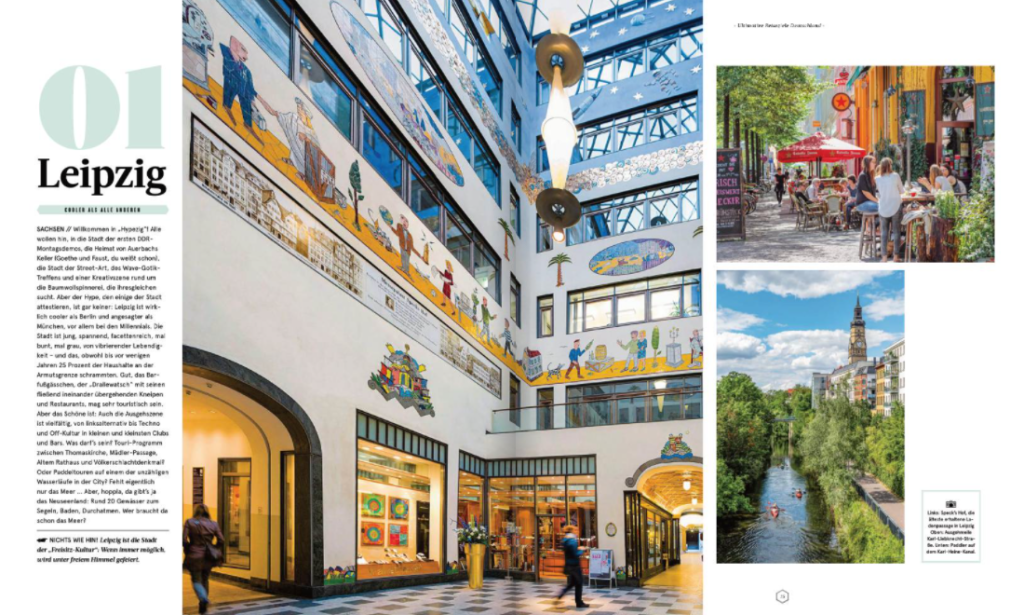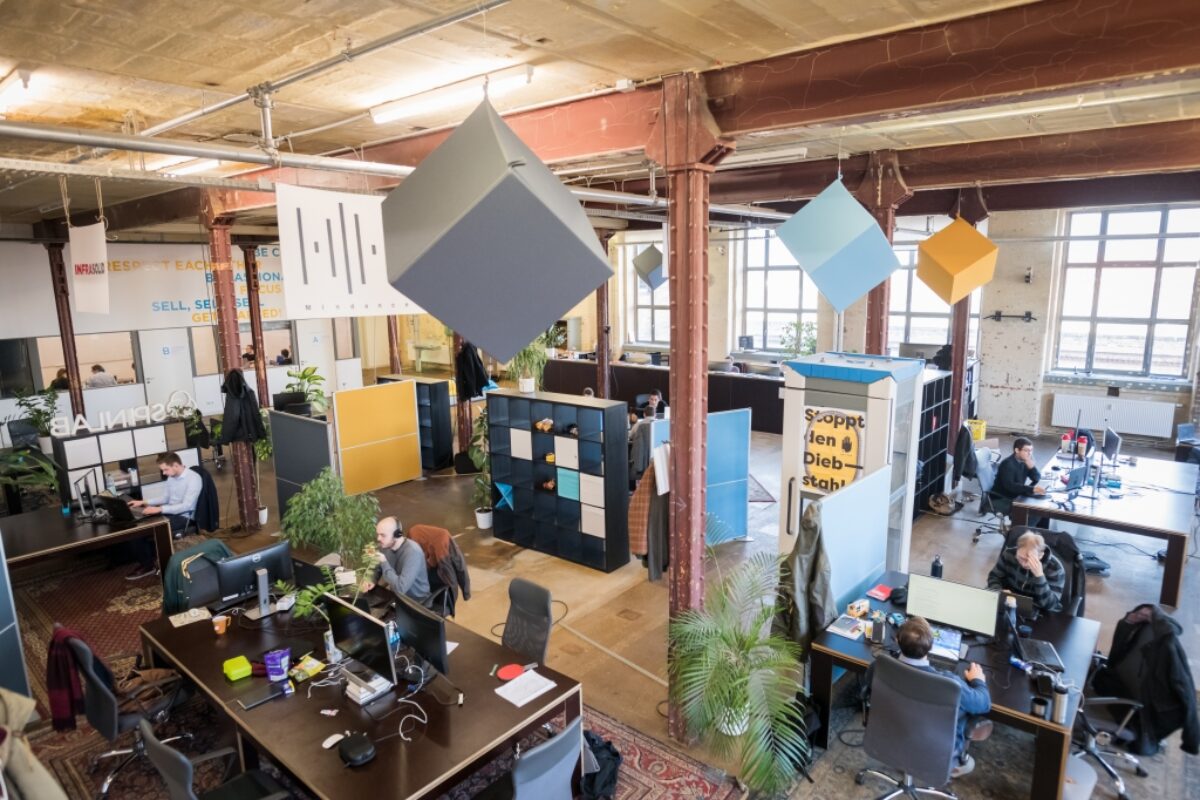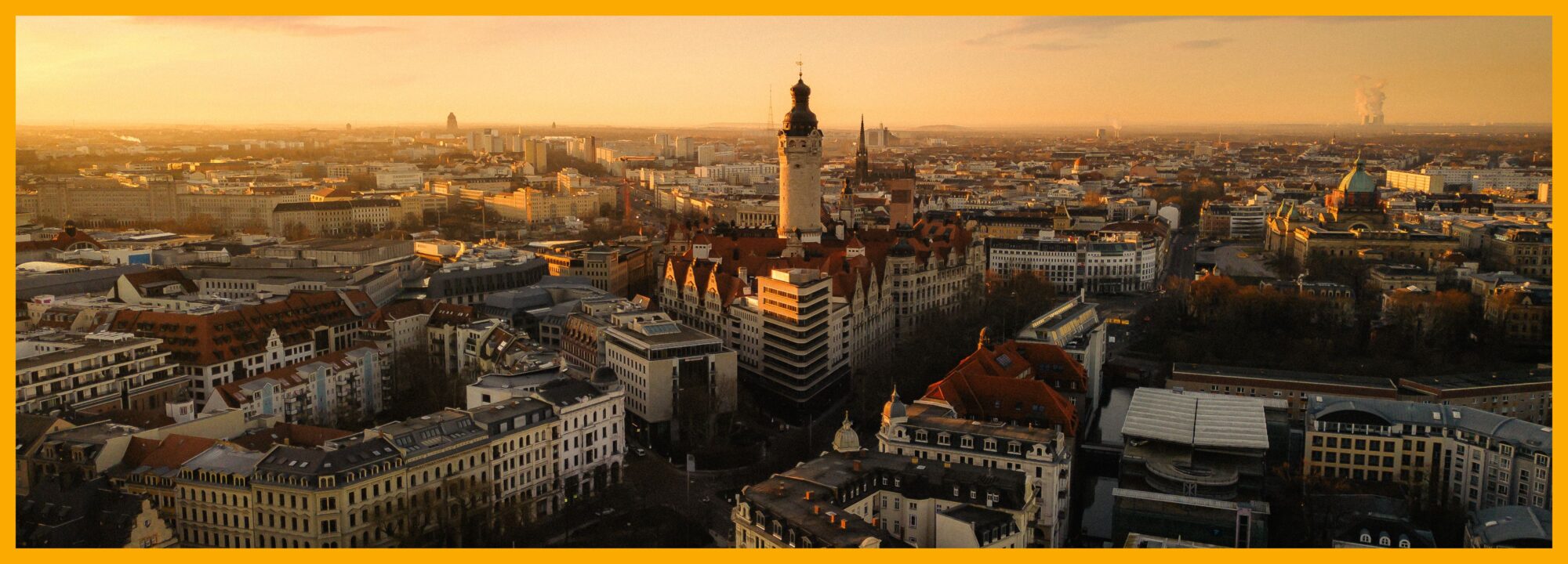LEIPZIG |
WELCOME TO THE HEART OF EUROPE
For centuries Leipzig has been a crossroads for trade uniting business people from East and West, North and South. Until today, the exchange of not only goods but also ideas and inspirations determines the heartbeat of the city. An atmosphere of openness and friendliness is created by its citizens.
Leipzig is a very attractive city. Since 2011 Leipzigs population has continously grown. A recent study by the Berlin Institute for Population and Development found Leipzig to be the most rapidly growing city in Germany, outstripping every other city in the country. A population of 700.000 is forecast for 2040. The reasons for the growth in population are (besides war-related migration movements) a very high living quality and a business-friendly and supportive environment, enabling sustainable development for startups, SMEs as well as big players.
632. 500+
Inhabitants
40. 500
Students
88. 000
growth in inhabitants since 2014
You are currently viewing a placeholder content from YouTube. To access the actual content, click the button below. Please note that doing so will share data with third-party providers.
More InformationGetting to Leipzig is easy
Leipzig has excellent transport links. You may reach the city by train from Berlin within one hour, in three hours from Hamburg, Frankfurt or Munich.
- You may get to Leipzig by plane – via the Airport Halle-Leipzig
- You may reach Leipzig by train – arrive at our main train station
- You may go to Leipzig by bus
Some statistics
- eighth biggest city in Germany
- first documentary mention of the town in 1015
- home of the oldest trade fair in the world
- the city with the most balconys in Germany
- with more bridges than Venice (!)
- over 400 sports clubs, home of the RB Leipzig football club
- more than 35 theaters, stages, concert halls
- more than 1.400 bars, cafes and restaurants
Videos about the City of Leipzig
- ‘Home’ Leipzig – Young people show their impressions of the City of Leipzig and why they feel at home here
- Hypezig: Putting the Hype in Leipzig – Cinematic video of David Coulthard giving RB Leipzig's Emil Forsberg an F1 taxi ride through Leipzig
- Invest Region Leipzig – The brightest Indeed – A video that shows the advantages of Leipzig as a location for business and presents its potential as an investment region
- Leipzig: Because (almost) everything is just right! – A clip about the diversity in culture, business and sport in Leipzig
Persons who lived in Leipzig and made an impact on the world
- Gottfried Wilhelm Leibniz, mathematician, born, grew up and studied in Leipzig, 17th century
- Johann Sebastian Bach, composer, lived and worked in Leipzig 1723-1750
- Johann Wolfgang von Goethe, writer, studied in Leipzig 1765-1768
- Samuel Hahnemann, developer of homeopathy, studied in Leipzig in the 18th. century
- Clara Schumann, composer and pianist, born and grew up in Leipzig, 19th century
- Eugen Schmalenbach, HHL alumnus (1898-1900) and founder of the academic field of Business Administration
- Max Klinger, painter and sculptor, lived in Leipzig, 20th century
- Angela Merkel, German Federal Chancellor (2005-2021), studied in Leipzig 1973-1978
- Neo Rauch, painter, born and living in Leipzig
- Svante Pääbo, Swedish geneticist working in Leipzig, was awarded the Nobel Prize in 2022 for his discoveries concerning the genomes of extinct hominins and human evolution
- 70.000 people who peacefully demonstrated in Leipzigs city center on October 09, 1989 eye in eye with the armed forces marking the political change in Germany finally leading to the unification of the country after 40 years of separation
New York Times 2020: Leipzig - a place to go
In January 2020, The New York Times recommended Leipzig as one of the 52 destinations to visit globally.
The influential daily titled the Leipzig entry “From industrial center to shrinking city to newest cool-kid town” and described Leipzig as a “city of cool people.” Thirty years after German reunification, Leipzig’s modern transformation is impressive. Leipzig’s factories, left in ruins after 1990, have been replaced by lofts, galleries, studios, clubs and restaurants. Leipzig’s west, once the site of a large number of factories, has become home for a vibrant cultural scene.

Lonely Planet 2021:
Leipzig – ultimate destination in Germany
In October 2021, Leipzig was recommended as a
top German destination in the latest edition of
“Ultimate Destinations in Germany” published
by Lonely Planet.
The city was listed #1 out of 250 presented most popular destinations.
HWWA City Ranking 2020 Leipzig - Top 2 in Trend index
In the 2020 HWWI/Berenberg city ranking of the Hamburg Institute of International Economics (HWWI) and the private bank Berenberg Leipzig once again achieved second place in the overall ranking and takes the top spot in the Trend Index.
The study examined the competitiveness of Germany’s 30 largest cities. The cities are examined in terms of their current economic performance (trend index), future demographic trends (demographic index) and key location factors such as education, innovation, internationality and accessibility (location index).
As in the last ranking, Leipzig is the front-runner in the trend index, followed by Berlin and Cologne in second and third place. In the overall ranking, Leipzig holds its own in second place, narrowly missing out on victory. No other city has been able to improve its economic performance as dynamically in recent years as Saxony’s largest city. At just under 7%, it has also recorded the highest population growth of all 30 cities in recent years. And this trend is set to continue, with Leipzig also leading the way in population forecasts up to 2030, especially for the under-20s and the working population.
The excellent developments in the trend and demography index are so high in Leipzig in comparison that the poorer performance in the location index has been overcompensated for years.
IW City Ranking - Leipzig among the Top 10 most dynamic cities
Leipzig is one of the ten most dynamic cities in Germany, according to a study of the Institute of the German Economy (IW). In the 1919 city ranking Leipzig ranked ninth out of a total of 71 large municipalities. The trade fair city thus improved by four places compared with the previous year in terms of dynamism. Movement in the labor market in particular had increased in Leipzig: In a nationwide comparison, Leipzig landed in fourth place.
For the annual survey, the IW Consult company of the IW, which is close to employers, compares the current economic strength, rates of change of certain indicators (dynamics) and future prospects of 71 independent cities with more than 100,000 inhabitants. Factors such as economic structure, labor market, real estate, research strength and future industries are analyzed.
42
Average age of the Leipzigers
28 %
of people in work have a college degree
92 %
Employment rate
Leipzig attracts investors
The latest business report of the City of Leipzig “Leipzig Means Business 2020” presents the following lighthouse projects:
Beiersdorf: New production plant Leipzig is broadening its industrial base with a new major investment in the north of the city. Beiersdorf AG from Hamburg plans to open a new production facility for cosmetics and body care products at Seehausen II Industrial Estate as early as 2022. Initially 200 new jobs are planned. The plant is expected to grow in the following years, taking the headcount to perhaps 700. It will eventually be part of a strategic, Europe-wide manufacturing network.
Mercateo relocates to Leipzig
On 18 December 2019, the City of Leipzig and Mercateo, an operator of procurement platforms for business customers, announced that the company would be relocating its headquarters from Munich to Leipzig. This move was prompted by Mercateo’s planned growth in
Leipzig as well as the green light for a building plot in the city centre, where the company is already building its own office block.
Amazon Air starts operations at Leipzig/Halle Airport
Amazon Air has opened its first European regional air freight centre, creating 200 new jobs in the region.
Porsche starts fifth expansion phase
The sports car manufacturer is investing €600 million in its Leipzig plant for the production of the new generation of the Macan. This marks the start of the fifth expansion of the plant.
BMW to build battery modules in Leipzig
Starting in 2021, the BMW Group’s plant in Leipzig will make battery modules for the high-voltage batteries required by electric vehicles. Anticipating increasing sales of electric cars, BMW will invest over 100 EUR million there by 2022. This investment will create modern jobs in Leipzig and make the production of electric vehicles in Germany even more sustainable.
Leipzig’s Focus Industries
Under the motto ‘strengthening the strengths’, Leipzig places emphasis on five high-growth sectors whose basic structures are already satisfactorily developed. Well-structured businesses exploiting their own particular niches working cheek by jowl with R&D ideas factories constitute nodes of a whole series of networks.
Automotive & Supplies
- Two major integrated car plants owned by world-famous carmakers
- Expertise in the e-mobility sector thanks to BMW and Porsche
- Integrated into global production networks
- Just-in-time and just-in-sequence connection of medium-sized suppliers
- Redundant connection of factory sites to the trans-European motorway network
- Developed plots available near the car plants for additional suppliers
Source: Leipzig Means Business 2020
Healthcare & Biotech
- Highly innovative, transfer-oriented research institutes
- Networked life sciences and engineering sciences at several universities
- Conducive environment for startups
- Excellent laboratories and offices available at BioCube and BIO CITY LEIPZIG
- Productive ties between science and industry
- Centre of international trade shows and conventions
- Biotech segment integrated into the logistics/air cargo hub
Source: Leipzig Means Business 2020
Read more: Cluster Broschure by the City of Leipzig
Energy & Environment
- Actively shaping the energy and mobility transition
- Pole position in continental European energy trading
- Seat of several major energy corporations
- Proven market cooperation with mediumsized enterprises
- Location of manufacturers and users in e-mobility
- Close ties between industry and research
- Expertise in the large-scale application of innovative environmental technologies
Source: Leipzig Means Business 2020
Logistics
- Trimodal road-rail-air hub for distribution throughout Europe
- Europe’s fifth-largest cargo airport
- Integration into international rail container routes, all the way to China
- Host of the World Transport Forum
- Innovative, practical IT location with Logistics Living Lab
- 5G telecoms system with pioneer region in north Leipzig
- Logistics cluster integrated by the Central German Logistics Network
Source: Leipzig Means Business 2020
Read more: Logistics Broschure by the City of Leipzig
IT, Media & Creative Industries
- Powerful, innovative IT sector with outstanding telecoms infrastructure
- HQ of public broadcaster MDR
- Networks offer plenty of scope for synergies
- Influential industry gatherings such as the Leipzig Book Fair and DOK film festival
- Pioneering higher education programmes in the media
- Thriving startup scene, festivals with an international impact
- Wide range of premises for creatives from coworking spaces to lofts
Source: Leipzig Means Business 2020

Founders welcome!
Leipzig is experiencing a new wave of startups with an estimated 200-250 currently operating in the city. Whereas the first startups in Leipzig focused on e-commerce (one example being Spreadshirt, now 750-strong), they later on spread to areas like big data and aspects of infrastructure such as energy (e.g. Energy2market) and mobility (nextbike, Flynex, busnetworx). In the life sciences, healthcare and biomedical engineering, companies like futalis and PHACON have become established players.
Leipzig is more successful than any other location in eastern Germany at attracting startups. They either open branches here (e.g. trivago, CHECK24, Verivox, SelfDiagnostics) or even relocate lock, stock and barrel to Leipzig (e.g. DIPAT, QLX, Sensape, replex, food.de, Wundercurves, SelfID Technologies). Leipzig is Germany’s digital hub focusing on smart infrastructure. Numerous incubators and coworking spaces offer founders business premises, expertise and dialogue on floorspace totalling several hectares.
Founder initiatives and incubators
- 2b AHEAD Ventures
- AGIL GmbH Leipzig (technology scouts)
- Basislager Coworking for Startups and Freelancers
- futureSAX – Innovation Platform of the Free State of Saxony
- HHL DIGITAL SPACE – The Digital Transformation Platform
- HHL Leipzig Graduate School of Management
- Incubator for Technology Startups, InfAI
- Institute for Applied Informatics
- SMILE – Self Management Initiative LEipzig
- Social Impact Lab Leipzig for Social Startups
- SpinLab – The HHL Accelerator
- Startbahn 13 – startup consulting at HTWK Leipzig
- StarterCenter of the Chamber of Commerce and Industry and the Chamber of Small Industries and Skilled Trades
- The Medical Forge Leipzig – Accelerator for Smart Data, Medical Devices and Therapies
- ugb business start-up centre
Event formats for founders
- Accelerate@HHL Conference
- Chaos Communication Congress
- DreamHack Leipzig
- Women Overtake Differently
- FuckUp Nights Leipzig
- futureSAX Founders’ Forum (Leipzig)
- Founders’ breakfasts and discussion
- forums (e.g. Basislager, Gründernest, SMILE, Social Impact Lab)
- Hackathons
- HHL SpinLab Investors Day
- Chamber of Commerce and Industry
- Founders’ Evening
- Smart Infrastructure Meetup
- SMILE Coaching for Founders
- SpinLab & Smart Infrastructure Hub
- Community Party
- Startup SAFARI Leipzig
- Startup Weekend
- ugb startup seminars
HHL's startups in the region
- 300+ startups set up by HHL alumni
- 40,000+ new jobs created by HHL alumni companies
- Including 48 in Saxony with 1,000 employees
- 44 in Leipzig with about 920 employees
- most prominent example in Leipzig: online platform for customizing and selling T-shirts Spreadshirt
- most prominent example in the region: online optician Mr. Spex with a European-wide shop network
Ready for Leipzig? Ready for a new chapter
in your life?
Let`s meet in Leipzig! Check out our Leipzig events:
(The information given on this page on Leipzigs economy was taken from Leipzig’s Economy Report 2020 “Leipzig Means Business”. The Leipzig statistics were taken from leipzig.de.)
Photo credits: Andreas Schmidt

